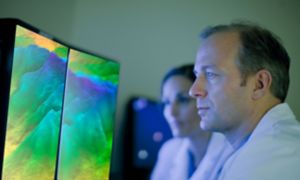Type of activity
Chemistry
Oil & Gas
Territory protection
Economic diversification
Access to water and sanitation
Education

Or , our new artificial intelligence tool.

In Ghana we are present in the exploration sector, in refining and in the chemicals sector. With Offshore Cape Three Points (OCTP), the only gas development project entirely dedicated to the domestic Sub-Saharan Africa market, the country guarantees reliable gas supplies, making a significant contribution to energy access and local economic development. In Africa we strengthen and diversify our traditional portfolio to exploit natural gas, we launch initiatives based on the circular economy model and we promote development initiatives across the continent to foster lasting growth.
Activity start date: 2009 - present
Exploration activities in Ghana are concentrated off the coasts of the country. The Offshore Cape Three Points (OCTP) exploration project makes it possible to sell gas on the local market at a competitive price, satisfying 65% of the country’s energy demand. As well as eliminating fugitive emissions of methane, the extraction of non-associated petroleum gas permitted by OCTP offers additional environmental benefits because it makes it possible to run the new power plants on gas and to replace crude oil with gas in existing plants. We also participate in an additional exploration license in the offshore CTP 4 block, where we develop the wells discovered using the infrastructure already in situ.
In order to make use of local resources, we have also launched initiatives to provide training to micro-enterprises and access to water resources, education and healthcare, also through the distribution of improved stoves, with the aim of guaranteeing the population access to more efficient energy sources, which significantly reduce wood or charcoal consumption in cooking.
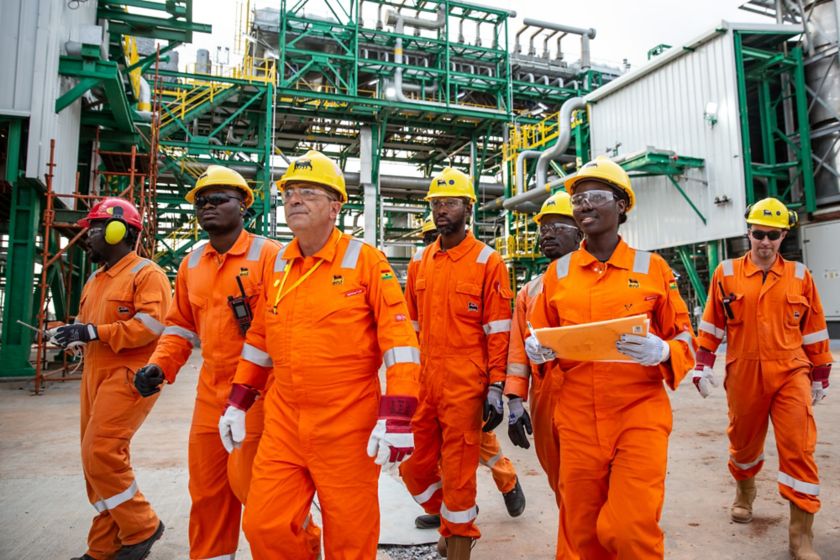
Workers at Ghana's land plant
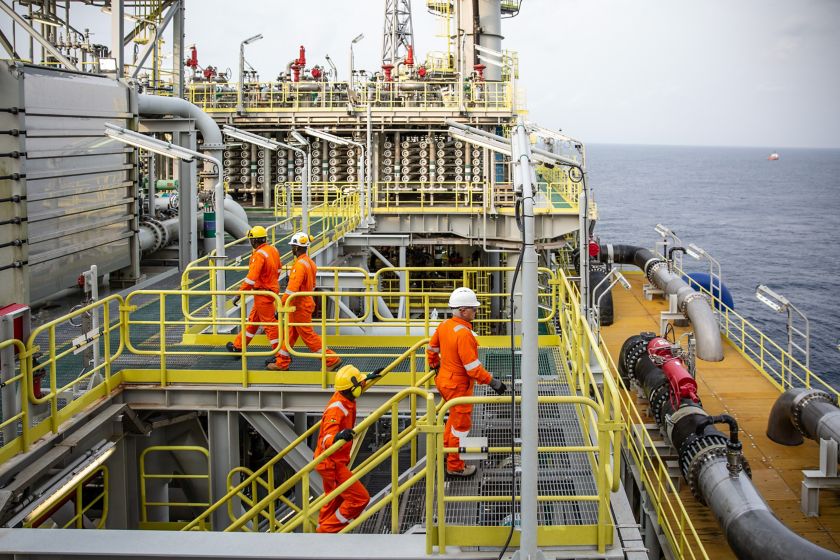
Ship processing gas with workers on board
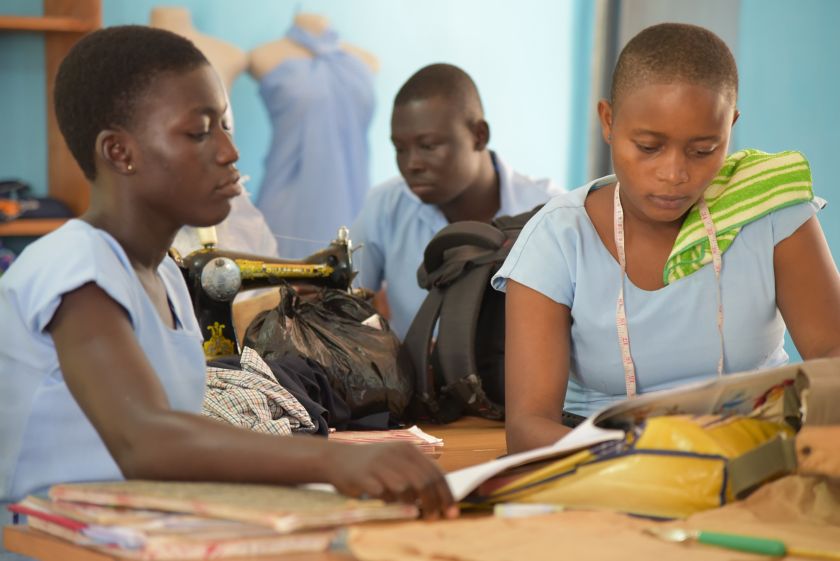
Beneficiaries of the Livelihood Restoration Plan project in the classroom
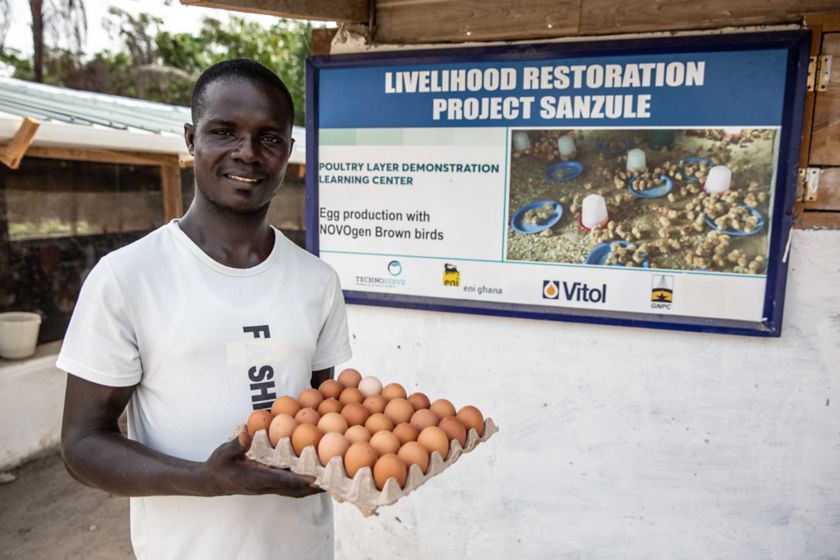
Livelihood Restoration Plan beneficiary
annual oil and condensate production (million barrels)
annual natural gas production (billion cubic feet)
annual hydrocarbon production (millions of barrels of oil equivalent)
invested in the Livelihood Restoration Plan
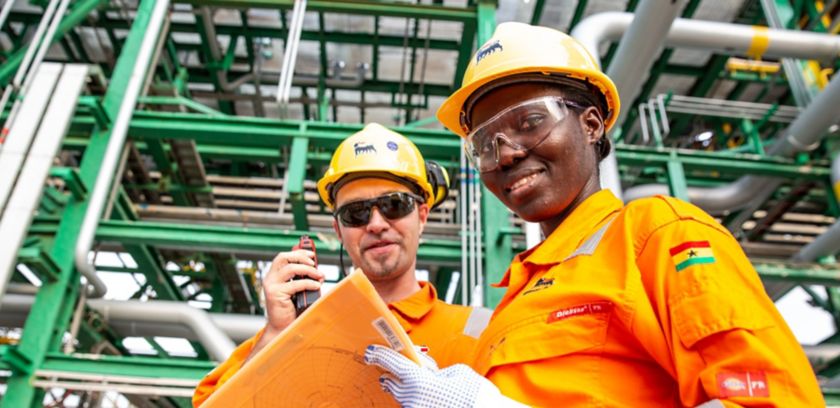
The integrated project off the west coast of Ghana for the domestic market started production early.
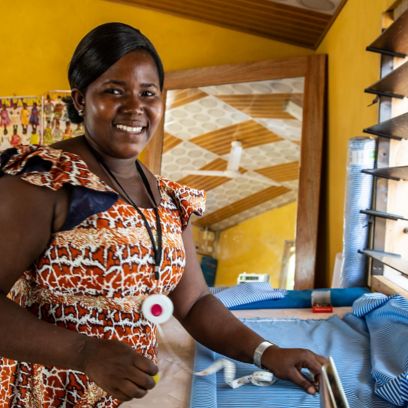
In and around the Western Region, they supported communities to start new sustainable, pro-growth activities.
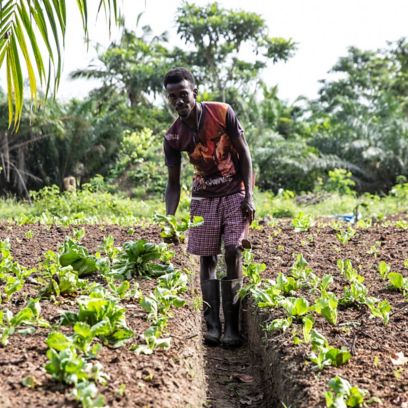
This project has helped students to enter the job market and access microcredit schemes, boosting the agricultural sector's growth.
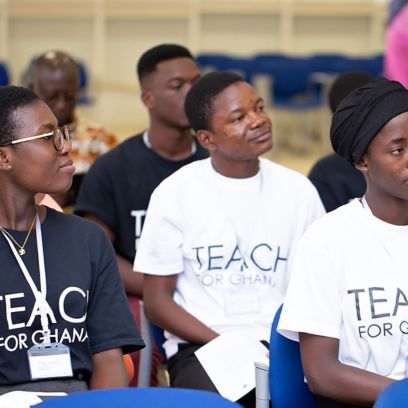
We select graduates in science, arts, engineering, English and other subjects to support primary and secondary school teachers.
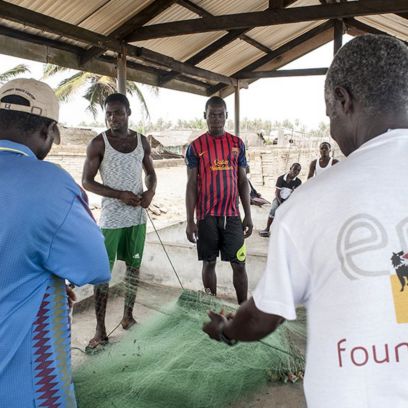
Bradley Tower Building
William Tubman Road Ridge
PMB KA 185 - Accra - Ghana
+233(0)302 761790 - +233(0)302 761786

If you want to change topic, clear the chat and make a new query to receive more relevant results.
This will delete the question history.
If you want to change topic, clear the chat and make a new query to receive more relevant results. This will delete the question history.
Here you can find the full list of your queries.
The answers are generated by artificial intelligence, therefore they may contain inaccuracies. Please read the terms and conditions of use.

EnergIA is an innovative tool based on artificial intelligence capabilities, which can help you navigate the contents of eni.com, quickly finding answers to your questions. EnergIA can also perform a search on a specific topic, providing the most up-to-date data available, or it can invite you to delve deeper into a topic of your interest by suggesting links and specific readings. Start now!
EnergIA is an innovative tool based on artificial intelligence capabilities, which can help you navigate the contents of eni.com, quickly finding answers to your questions. Start now!
EnergIA (ener'dʒia) is a system based on Generative Artificial Intelligence.
Thanks to this technology, we can respond to your requests by querying the most relevant content and documents available on eni.com. (Note: financial documents from the last 12 months and press releases from the last 2 years are considered.)
Through EnergIA, you can delve into topics of interest and have a real-time window into the world of Eni.
If you wish to search for a specific document, press release or news, use the traditional search engine via the magnifying glass icon.
Like all systems that leverage Generative Artificial Intelligence, EnergIA may generate inaccurate or outdated responses. Always consult the sources that EnergIA proposes as the origin of the generated information.
If the system fails to find an exact match for the requested content, it still tends to provide a response.
If you find any inaccuracies in the provided response, please send us your feedback at the bottom of the page: it will be very helpful for us to improve.
Remember that the content generated by the system does not represent Eni’s official position. We therefore invite stakeholders to refer to their designated contacts for official statements: Press Office for journalists, Investor Relations for analysts and investors, Company Secretariat for shareholders etc..
EnergIA can understand questions posed in almost all languages, but we prefer to provide you with a response in English or Italian, the two languages available on eni.com. If you ask a question in Italian, the content on the site in Italian will be consulted. If you ask it in English or any other language, the content in English will be consulted. (Note: the language Eni uses for financial documents/content is predominantly English.)
If questions are formulated that violate the set security criteria, the system will not proceed with processing the response. Please remember not to send personal data.
By using this service, the users acknowledge that they have read and accepted the terms and conditions of use.
Search
EnergIA (ener'dʒia) is a system based on Generative Artificial Intelligence.
Thanks to this technology, we can respond to your requests by querying the most relevant content and documents available on eni.com. (Note: financial documents from the last 12 months and press releases from the last 2 years are considered.)
Through EnergIA, you can delve into topics of interest and have a real-time window into the world of Eni.
If you wish to search for a specific document, press release or news, use the traditional search engine via the magnifying glass icon.
Like all systems that leverage Generative Artificial Intelligence, EnergIA may generate inaccurate or outdated responses. Always consult the sources that EnergIA proposes as the origin of the generated information.
If the system fails to find an exact match for the requested content, it still tends to provide a response.
If you find any inaccuracies in the provided response, please send us your feedback at the bottom of the page: it will be very helpful for us to improve.
Remember that the content generated by the system does not represent Eni’s official position. We therefore invite stakeholders to refer to their designated contacts for official statements: Press Office for journalists, Investor Relations for analysts and investors, Company Secretariat for shareholders etc..
EnergIA can understand questions posed in almost all languages, but we prefer to provide you with a response in English or Italian, the two languages available on eni.com. If you ask a question in Italian, the content on the site in Italian will be consulted. If you ask it in English or any other language, the content in English will be consulted. (Note: the language Eni uses for financial documents/content is predominantly English.)
If questions are formulated that violate the set security criteria, the system will not proceed with processing the response. Please remember not to send personal data.
By using this service, the users acknowledge that they have read and accepted the terms and conditions of use.
A new window into Eni’s world, at your disposal. EnergIA is an innovative tool based on artificial intelligence capabilities, which can help you navigate the contents of eni.com, quickly finding answers to your questions.
